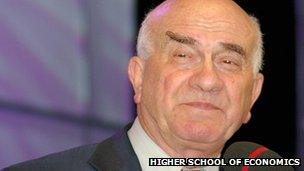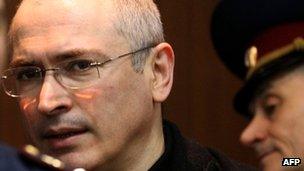Viewpoint: Russia's economy needs to reform
- Published

Evgeny Yasin: reforms are needed
Between 1989 and 1998, Russia went through a severe crisis. It was a crisis of transformation caused by the collapse of the Soviet system and a wide range of reforms.
As a result, Russia became a country with a market economy.
By 1995-1997, institutions of this new economy were still in their infancy. However, the troubles of socialism, including some of the most obvious, such as the lack of goods in the shops, were over.
Money now had real value and a new structure of the economy came into being. For the first time in decades it was based on the concept of supply and demand.
Oil economy
There is a lot of talk about how the Russian economy depends on exporting fuel and raw materials, but this is something that was also true decades ago. In the late 1960s, rich oil and gas deposits were discovered in Western Siberia. This dependency only strengthened as oil prices around the world peaked in the 1970s.
During the transformational crisis of 1989-1998, Russia's economy contracted by 40% and its industrial output fell by 55%. A decline of this magnitude is unheard of, at least in peacetime.
The final blow was delivered by the financial crisis of 1998. It also led to political changes: the government of reformists was forced to resign. Russia was now facing its first change of president in post-Soviet history.
But after the crisis of 1998, which saw oil prices drop to their lowest point since 1973 to $12 per barrel, things started to pick up again.
Growth from a low level
Russia's economy grew very quickly between 1999 and 2008, so quickly in fact that many became convinced that Russia was ready to join the elite club of developed countries.
Over these years, Russia's gross domestic product (GDP) increased by 185% compared with 1998. Its average rate of growth reached 7.3% per year.
This was what made Russia one of the Bric countries, as defined by Goldman Sachs. These countries were seen as the world's locomotives for growth in the early 21st century.
But it's worth remembering that this growth followed a very difficult crisis; and that comparisons were being made with the worst days of that crisis.
Compared with the 1989 level, inflation was 108% in 2008.
Over the same time period, people in Russia started spending more and saving less. Savings fell from 31% to 19% of GDP.
Mixing business with politics

Mikhail Khodorkovsky became a symbol of conflict between business and the state
On the whole then, the years 1999 to 2008 were a period of reconstructive growth and the factors that defined it are unlikely to return. Even if they do, their effect will probably be much weaker.
The whole decade can be broken down into two distinct parts.
The first one (from 1999 to 2003) saw quick economic growth and cooperation between businesses and the authorities. Business activity levels were high; industries that had been underperforming were now coming back online and oil prices remained moderately low ($20-25 per barrel on average).
But in 2003, a new conflict between business and the authorities became apparent. It culminated in the sentencing of billionaire businessmen Mikhail Khodorkovsky and Platon Lebedev. Politically, election regulations were tightened, and the regime, on the whole, became less liberal.
The second stage, covering the years of 2004-2008, saw the state interfering more and more with the economy as business activity fell. However, this was happening against a background of very high oil prices and cheap foreign credit. These factors kept businesses alive and foreign investors interested, often artificially.
Need for reform
As the global financial crisis of 2008-2009 struck, things changed again. The factors that had been supporting the growth in Russian GDP started tailing off.
One of these factors was the increase in the size of the workforce. Before 2008, it grew about 2% a year. In the near future the trend is likely to be reversed, and the workforce will start contracting by 1% a year.
Russian exports are also likely to become less favourably priced.
So the conclusion is that Russia's growth is likely to slow down, even as oil prices remain high, unless Russia carries out institutional reform.
Property rights need to be protected and true economic and political competition introduced to Russia. The country also needs to guarantee the rule of law.
Unless these steps are taken, it would be wrong to expect a marked growth in the levels of business activity.
- Published27 November 2011
- Published28 November 2011